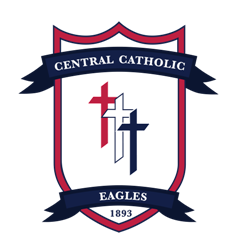Counselor Services
The Central Catholic High School Counseling Program provides comprehensive and sequential services to all students in grades 6-12. The primary goal of the school counseling program is to support the success of all students by providing academic, college and career, and personal/social counseling.
HIGH SCHOOL CODE: 191-870

ACT INFORMATION
COLLEGE PLANNING INFORMATION
TOPS INFORMATION
FINANCIAL AID AND LOCAL SCHOLARSHIPS
FORMS
- Request for Transcript (page 1) Request for Transcript (page 2)
- Course Drop Form
- Teacher Recommendation Form (scholarships)
Visiting a College or University
It is my strong recommendation that when making this important decision that you visit the Universities that you are considering. The campus visit work sheet is useful when visiting the school. It will help you keep track of what you liked and disliked. Below is a sample list of questions that you may want to ask while visiting the school.
Instructional Programs and Admissions
1. What college courses are required (a) of all entering freshmen, (b) for a degree and (c) in the department of the college in which you are interested?
2. What is the typical size of classes for freshmen? For upperclassmen?
3. Are there any internships available for students in the department in which you have interest?
4. Do they offer adaptive education for handicapped or leaning disabled students?
5. May qualified upperclassmen transfer at the end of two or three year special program such as engineering, medicine, law, dentistry or pharmacy?
6. Is the college on a quarter, trimester or semester system?
7. Is the university accredited?
8. Are Advanced Placement courses accepted? What score will enable you to receive Advanced Placement credit at the university?
9. Are there a number of course offerings besides those required for your major?
10. How often are particular courses (especially those required for your major) offered?
11. What is the percentage of students who go on to graduate school? Is there a graduate school affiliated with the university?
12. How many students stay past their freshman year?
13. What is the percentage of graduating student athletes?
14. Are professors easily accessible to students?
15. How selective is the admissions process?
16. How does the university calculate high school grade point average for scholarships and admissions?
17. What standardized test does the university prefer for freshmen admissions? Will they accept ACT over SAT and vice versa? Will they accept ACT in lieu SAT II subject tests?
Campus and Buildings
 Button
Button1. Does the college campus appeal to you? How large is it? Is it easy or difficult to get around?
2. Is it near enough to or far enough away from the local community? Does the community environment appeal to you?
3. Is there easy access to stores and other facilities?
4. Is it handicapped accessible?
Housing and Dining Facilities
1. What types of housing are commonly available to freshmen? Are freshmen required to reside in the college dormitories?
2. Are the dormitories fully furnished or will you have to furnish it yourself Are the dorms coed?
3. Are students permitted to select their own roommates? If not, how are they assigned?
4. Are private dorms available? What is the additional cost?
5. What type of deposit is required? Is it refundable? What is the housing deadline?
6. Are three meals served seven days a week? Where are meals served? What is the cost of the meal plan?
7. Can special diets be arranged for students who require them?
8. Is there a good snack bar or other student eatery on or near campus?
Personal and Health Services
 Button
Button1. What members of the college staff are available to counsel you with personal problems, vocational plans, academic adjustments, and choice of courses?
2. Does the college provide special testing services for freshmen? Are career interest and aptitude services available?
3. Are medical, dental and nursing services available on campus?
4. Does the college have a hospital near the campus?
5. To what extent does the college offer a job placement service for students who need part-time work during college? What part-time job opportunities are there for freshmen? Does the college provide graduating students with opportunities to interview prospective employers on campus?
6. Does the college have support services for students with learning disabilities or handicaps?
Religious Facilities
 Button
Button1. Is there a chapel, church or synagogue near or on campus?
2. Does the college approve or sponsor the type of religious club in which you have interest?
Social and Recreational Facilities
1. Does the college have a union or commons that is the center for student activities?
2. If the college is not coed, what arrangements are made for mixers, dances and parties?
3. Does the college have good indoor and outdoor facilities for both in and intercollegiate sports?
4. What other leisure time activities and facilities are available to students?
5. Does the college offer c
College Costs
1. What are the costs per year for students attending college, exclusive of travel costs?
2. What are the estimated extra costs to the student for belonging to a fraternity/sorority?
3. What financial assistance is available? How does an entering freshman apply for aid? What is the basis for granting financial aid? If necessary, will the college meet all of your financial need?
4. What scholarships are available to entering students? How does one apply for these scholarships? What are the deadlines? Does the department in which I plan to major offer scholarships to incoming freshmen?
5. What are the average cost of books, dorms, meal plans and out-of-state fees?
6. How are tuition and fees to be paid? In full at the beginning of the semester or can they be deferred? If in Louisiana, how will the university apply TOPS to my account?
College Regulations
1. What attendance requirements does the college demand of the student? Does the college require regular attendance? Is there a specific limit to the amount of absences allowed?
2. What level of academic performance is required?
3. What is the policy of the college regarding the possession of and use of automobiles by students? Of alcohol? Of drugs?
4. Is the college strict or liberal in its regulations?
5. Is the college on an honor system?
College Atmosphere
1. Do members of the staff and faculty seem friendly and helpful in their attitudes and relations with the students? Are they courteous toward visitors?
2. What is the attitude of the student body toward the college?
3. Is the college a commuter campus, or do most people live on campus?
4. How secure is campus?
5. Is the student body diverse?
Choosing A College or University
Choosing a college can be a difficult and stressful decision. Examine your interests, talents, wants and needs in great detail. Look at each of the following categories and begin to examine the colleges or universities that you are considering. You can find the answers to these questions by visiting the institution’s website, contacting the admissions office or by requesting information through the mail.
Location/Environment:
How far away do you want to go? (A day’s drive, a couple of hours, a plane ride away?)
Do you want to go to a college in a large urban city, a small rural area or somewhere in between?
Do you want to stay in state or out-of-state?
Is the campus a safe one? (Does the university consider safety
important?)
Do you want to attend a private or public institution?
Do you want to attend a religiously affiliated university or a military
academy, etc?
Size of College:
 Button
ButtonDo you prefer a large or small school setting?
A large school has approximately 20,000 plus students.
A medium school has between 5,000-20,000 students
A small school has fewer than 5,000 students.
Student Services:
What kind of extracurricular activities are offered? (Often, larger
schools will have a larger variety of activities)
What kinds of facilities, both academic and recreational, are
offered?
What kind of disability services are offered?
How strong is the athletic department? Is it a NCAA division I, II, or
III?
Admissions:
 Button
ButtonWhat schools will admit you based on your G.P.A. and standardized
test scores? (Admission requirements vary from one school to
another)
How selective do you want the University to be?
Can you get a scholarship based on your academic record?
Academics:
 Button
ButtonWhich schools offer the major you are considering?
What class size is comfortable for you?
What is the student to teacher ratio?
How prestigious is the program you are considering?
What kind of computer labs are available for you?
Are internships available?
Are independent study programs offered?
College Expenses:
How expensive of a school can you afford to attend?
(Remember to consider tuition, room & board, transportation, books, and miscellaneous fees)
By this point, you should have your list narrowed down to no more than five colleges that you are seriously considering. Two of those five should be ones that you aspire to get accepted to, the next two should be ones that you would like to attend and the fifth choice should be one where you are guaranteed acceptance.
FAFSA Quick Guide
- Complete the FAFSA. (Free Application for Federal Student Aid) This can be done using the paper version or online version.
- If you choose the online version, you will need to obtain a Federal Student Aid PIN to electronically sign the form. Both parent and student will need a PIN.
- Once you have applied you will receive a Student Aid Report (SAR) either electronically or via the mail. Review it thoroughly and correct any errors.
- Mrs. Tycer will automatically submit final grades to the TOPS office after graduation.
- ACT will report scores directly to the TOPS office. (For faster processing, you may want to include the TOPS code (1595) on the ACT registration)
- SAT will NOT report scores directly to the TOPS office. You will need to put the TOPS code (9019) on the registration.
- The Louisiana Office of Student Financial Assistance will contact you during the summer via the mail regarding whether or not your student is eligible to receive TOPS.
The deadline to file for TOPS is July 1st.
Please note: The FAFSA form is used for federal aid and TOPS. TOPS is awarded based on a 2.5 GPA on the TOPS core curriculum and a 20 on the ACT. It is not awarded based on financial need, but you will still need to complete the FAFSA to qualify for the TOPS award.



